US mass transit faces $6 billion funding shortfall, threatens commuters, travel
- In Reports
- 01:41 PM, Apr 30, 2025
- Myind Staff
Five years after the COVID-19 pandemic caused a sharp decline in U.S. public transit usage, ridership is returning, but the financial recovery is slow. Major transit agencies are facing a combined shortfall of $6 billion, as federal emergency aid runs out and fare revenue still hasn’t reached pre-pandemic levels.
Even though more people are using public transportation, systems that depend on fare income are finding it hard to balance their budgets. SEPTA, which serves Philadelphia and its suburbs, is expecting a $213 million deficit. To address this, SEPTA plans to cut 45% of its services and raise fares by 21.5%, the biggest fare hike in its history. Other cities like New York, San Francisco and Chicago are also facing similar challenges, with budget shortfalls possibly leading to up to 40% service cuts.
The situation is made worse by political issues, including the potential for federal spending cuts under the Trump administration, which could worsen financial problems for transit agencies. Meanwhile, other cities like London and Paris have recovered better, with increased ridership and more government support. U.S. transit agencies are under pressure to fix old infrastructure and avoid service disruptions, which could lead to longer commutes, lost work hours, and more people driving, undermining efforts to reduce pollution and fight climate change.
The situation is even more difficult with the upcoming FIFA World Cup, as major U.S. cities must figure out how to handle millions of visitors while dealing with budget cuts. As U.S. transit systems struggle to stay afloat, the future of public transportation in many areas is uncertain.







Comments